|
Progressive Men of Minnesota
Minneapolis Journal
1897
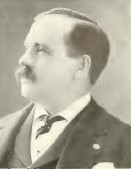 ANDREW H. BURKE The subject of this sketch is
in the truest sense of the word a self-made man. Born in
New York City, May 15, 1850, of humble parentage, he was
left by the death of both father and mother at the age
of four years a homeless and friendless child in a great
city. That beneficent institution which has done so much
for unfortunate childhood, the Children’s Aid Society,
took him in charge, and at the age of eight years he was
sent West, where a home had been found for him with a
farmer who lived near Noblesville, in Indiana. Here he
lived and developed into a promising lad of exemplary
habits until he reached the age of twelve years. In 1862
he ran away to enlist in the service of his country as a
drummer boy in the Seventy-fifth Indiana
volunteers.
After serving in the war he returned home to take
advantage of such educational facilities as he was able
to procure, with the money he had saved from his pay as
drummer, he was enrolled as a student at Asbury, now De
Pauw University, at Greencastle, Indiana. From lack of
means, however, he was unable to pursue his studies
there as long as he desired, and was obliged, therefore,
to lay aside his books and seek employment in business
channels. Among his important business engagements was
that of business manager of the Evansville, Indiana,
Courier.
Subsequently he removed to Cleveland, where he
was employed in the service of a commercial agency. ANDREW H. BURKE The subject of this sketch is
in the truest sense of the word a self-made man. Born in
New York City, May 15, 1850, of humble parentage, he was
left by the death of both father and mother at the age
of four years a homeless and friendless child in a great
city. That beneficent institution which has done so much
for unfortunate childhood, the Children’s Aid Society,
took him in charge, and at the age of eight years he was
sent West, where a home had been found for him with a
farmer who lived near Noblesville, in Indiana. Here he
lived and developed into a promising lad of exemplary
habits until he reached the age of twelve years. In 1862
he ran away to enlist in the service of his country as a
drummer boy in the Seventy-fifth Indiana
volunteers.
After serving in the war he returned home to take
advantage of such educational facilities as he was able
to procure, with the money he had saved from his pay as
drummer, he was enrolled as a student at Asbury, now De
Pauw University, at Greencastle, Indiana. From lack of
means, however, he was unable to pursue his studies
there as long as he desired, and was obliged, therefore,
to lay aside his books and seek employment in business
channels. Among his important business engagements was
that of business manager of the Evansville, Indiana,
Courier.
Subsequently he removed to Cleveland, where he
was employed in the service of a commercial agency.
In 1877 he came to Minneapolis and was for two
years employed as a bookkeeper by N. B. Harwood &
Co., wholesale dry goods merchants. He was a fellow
employee with S. E. Olson, now one of the prominent
department store merchants of Minneapolis, and formed a
close personal friendship with that gentleman which has
continued ever since. Later he was employed by a lumber
firm at New York Mills. In 1880 he removed to Casselton,
North Dakota, where he was for a time engaged in
commercial business, and subsequently became cashier of
the First National Bank at that point. While holding
this position he was elected treasurer of Cass County,
and was twice re-elected and resided at Fargo, the
county seat, during his six years incumbency of said
office. In 1890 he was nominated by the Republicans for
governor of North Dakota and elected, being the second
officer of that rank in the new state. His
administration was a very successful one, highly
creditable to himself and advantageous to the state.
Upon the expiration of his term as governor he
removed to Duluth, where he now resides, and is engaged
in the grain commission business. In this he has been
highly successful, his honorable record both public and
private in North Dakota having served to bring him
business in his chosen line in larger volume than he
would otherwise have enjoyed. Governor Burke, as he is
still known, is a gentleman of high character, genial
manners, and creditable literary attainments, and is
held in great esteem by the people of North Dakota and
Minnesota, who admire him for his sterling qualities and
his native ability, and the distinguished success which
he has achieved in spite of the adverse circumstances of
his youth. He was married in Minneapolis in 1880 to Miss
Carrie Cleveland, who was then a teacher in the public
schools of that city. He has two daughters, who are twins, born in
October, 1885. Governor Burke is a thirty-third degree
Mason, and, although not a member, is a liberal
supporter of the Episcopal church, to which his wife and
daughters belong.
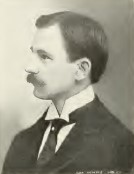 JOSEPH B. COTTON
One of the best known and most prominent of the
younger lawyers of Minnesota is Joseph B. Cotton, of
Duluth. Mr. Cotton is a native of Indiana. His father,
Dr. John Cotton, was a graduate of Rush Medical College,
of Chicago, and was a relative of the distinguished Rev.
Dr.
Phillips Brooks. His
mother’s maiden name was Elizabeth J. Riddle and, like
Dr. Cotton, she was a native of Ohio. JOSEPH B. COTTON
One of the best known and most prominent of the
younger lawyers of Minnesota is Joseph B. Cotton, of
Duluth. Mr. Cotton is a native of Indiana. His father,
Dr. John Cotton, was a graduate of Rush Medical College,
of Chicago, and was a relative of the distinguished Rev.
Dr.
Phillips Brooks. His
mother’s maiden name was Elizabeth J. Riddle and, like
Dr. Cotton, she was a native of Ohio.
Mr. Cotton was born on a farm near Albion, Noble
County, Indiana, on January 6, 1865. He worked on the
farm until he was sixteen years of age and since then
has made his own way in the world. His early education
was obtained in the schools of the district in which he
was brought up. A high school course at Albion followed
and afterwards a four years’ collegiate course in the
Michigan Agricultural and Mechanical College at Lansing.
He graduated from college in 1886 with the degree of B.
S. For the next two years he was tutor in mathematics at
his alma mater, at the same time studying law under Hon.
Edwin Willits, then president of the institution, and
formerly a member of congress from Michigan.
On June 13, 1888, Mr. Cotton was admitted to the
bar before the supreme court of Michigan. He almost
immediately came to Duluth and commenced practice. He at
once plunged into political life, taking active part in
the Harrison campaign which was then on. Four years
later he was nominated by acclamation by the Republicans
of St. Louis, Lake and Cook counties for the office of
representative in the state legislature, and in the
succeeding election received the largest vote cast for
any candidate for representative from the district. In
the house he introduced and was mainly instrumental in
passing a bill for a third judge for the Eleventh
Judicial district. This measure was one of the reasons
for his entering the legislature. He took an active part
in the fight for a new capitol, and helped secure the
passage of the bill. He was also very active in the
proposed terminal elevator legislation and was largely
instrumental in the defeat of the bill. His committee
service was on the judiciary, grain and warehouse,
municipal corporation, and tax laws committees. As an ardent
supporter of Senator C. K. Davis he made an
eloquent speech nominating the Senator for re-election,
which added much to his local reputation as an orator.
In college Mr. Cotton was orator of his class in both
junior and senior years, and was one of the eight
commencement orators chosen by the faculty from the
graduating class for high rank and scholarship.
Since 1891 Mr. Cotton has been a
member of the law firm of Cotton & Dibell, recently
changed to Cotton, Dibell & Reynolds. Since leaving
the legislature he has been the attorney for the Duluth,
Missabe & Northern Railway Company and the Lake
Superior Consolidated Iron Mine, and in addition to
these positions is now the vice president and managing
owner of the Bessemer Steamship Company and vice
president of several mining companies operating on the
Missabe Range. For something over three years he has
devoted himself exclusively to corporation law. Mr.
Cotton was one of the counsel for the defendant in the
McKinley suit in the United States Circuit Court against
the Lake Superior Consolidated Iron Mines, involving the
McKinley mine on the Missabe range,, and was one of the
counsel for the defense in the famous Merritt vs.
Rockefeller litigation, now pending in the United States
courts and growing out of mining transactions on the
Missabe and Gogebic ranges, immediately preceding and
during the panic of 1893. He has been of counsel during
the last two years in other important litigation in
Minnesota and Wisconsin.
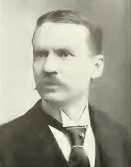 CHARLES d'AUTREMONT, JR. The story of the
origin of Charles d’Autremont, Jr., of Duluth, has all
such elements of romance and tragedy as are expected in
the lives of descendants of participants in the affairs
of Prance at the time of the revolution. Duluth is
indebted to the Reign of Terror for one of her most
prominent citizens. Mr. d’Autremont’s great grandmother
was Mme. Marie Jeane d’Ohet d’Autremont. She was the
widow of Hubert d’Autremont, and with her three sons,
Louis Paul, Alexander Hubert and Auguste Francois
Cecile, escaped from France in 1702, and settled on a
tract of land previously acquired on the Chenango River,
in the state of New York. They had been there but a
short time when they removed to a colony called Asylum,
established by French Royalists in Pennsylvania, on the
Susquehanna river, near the present town of
Towanda. A
few years later the oldest son, Louis, returned to
France with Talleyrand in the capacity of secretary to
that great statesman, he afterwards visited England and
Portugal as a representative of the French government.
When Napoleon in 1800 granted amnesty to the emigrants
who left France during the “Reign of Terror.” the colony
of Asylum was abandoned, nearly all its inhabitants
returning to France. But Mme. d’Autremont with her two remaining sons, went
back to the Chenango, where they remained until 1806,
when, having purchased a tract of land on the Genesee
river, they moved to Angelica, New York, where many of
their descendants have since lived. CHARLES d'AUTREMONT, JR. The story of the
origin of Charles d’Autremont, Jr., of Duluth, has all
such elements of romance and tragedy as are expected in
the lives of descendants of participants in the affairs
of Prance at the time of the revolution. Duluth is
indebted to the Reign of Terror for one of her most
prominent citizens. Mr. d’Autremont’s great grandmother
was Mme. Marie Jeane d’Ohet d’Autremont. She was the
widow of Hubert d’Autremont, and with her three sons,
Louis Paul, Alexander Hubert and Auguste Francois
Cecile, escaped from France in 1702, and settled on a
tract of land previously acquired on the Chenango River,
in the state of New York. They had been there but a
short time when they removed to a colony called Asylum,
established by French Royalists in Pennsylvania, on the
Susquehanna river, near the present town of
Towanda. A
few years later the oldest son, Louis, returned to
France with Talleyrand in the capacity of secretary to
that great statesman, he afterwards visited England and
Portugal as a representative of the French government.
When Napoleon in 1800 granted amnesty to the emigrants
who left France during the “Reign of Terror.” the colony
of Asylum was abandoned, nearly all its inhabitants
returning to France. But Mme. d’Autremont with her two remaining sons, went
back to the Chenango, where they remained until 1806,
when, having purchased a tract of land on the Genesee
river, they moved to Angelica, New York, where many of
their descendants have since lived.
The subject of this sketch was descended from
Alexander d’Autremont, whose son Charles retired from
business at an early age and continued to reside at
Angelica until his death in 1891. Mr. d’Autremont’s
mother was a daughter of Judge John Collins, of
Angelica. Judge Collins was a native of
Connecticut.
His wife was Ann Gregory, an English woman. He
was a lieutenant in the army in the war of 1812. After
the close of the war he, with others, purchased a large
tract of land in Allegheny County and moved there, to
practice his profession, and dispose of his land.
Charles d’Autremont, Jr., was born at Angelica, on June
2, 1851.
He commenced his education at Angelica Academy,
and in 1868 entered the freshman class at Cornell
University. On account of ill health he left college at
the end of his junior year and went to Lausanne,
Switzerland, and entered the Academy there. Upon his
return to America in 1872 he commenced the study of law
in the office of his uncle. Judge John G. Collins, at
Angelica. After reading with Judge Collins for a year
Mr. d’Autremont Avent to New York and entered Columbia
Law School, from which he graduated in the spring of
1875. After a summer in Europe he entered the law office
of Hart & McGuire, at Elmira, New York. Two years
later he opened an office of his own. In 1879 he again
visited Europe. The fall of 1882 found Mr. d’Autremont a
resident of Duluth. It came about by chance. On his way
east from a hunting trip on the Little Missouri, Mr.
d’Autremont happened to miss the steamer at Duluth, and
was compelled to wait over several days. This delay
afforded an opportunity of meeting the people of the
town, and he was so pleased with them, and so favorably
impressed with the place that, immediately upon reaching
home, he packed up his belongings and returned with his
family to Duluth.
In politics Mr. d’Autremont has been steadfastly
and consistently a Democrat. While at Elmira
he was a member of the Board of Supervisors of Chemung
County. In 1881 he was elected county attorney of St.
Louis County, Minnesota. Four years after he was the
Democratic nominee for attorney general of Minnesota,
but was defeated with the rest of the ticket. He was
elected mayor of Duluth in 1892, and in 1896 was a
democratic presidential elector for Minnesota. He
participated actively in the Greeley campaign of 1872,
the Tilden campaign of 1876 and the Hancock campaign of
1880, and was president of Tilden and Hancock clubs at
Elmira. In the Hancock campaign he spoke in both New
York and Pennsylvania, and since coming to Minnesota has
been in demand as a political speaker.
On April 21, 1880, Mr. d’Autremont and Miss
Hattie H.
Hart were married at Elmira, where Mrs.
d’Autremont’s father, E. P. Hart, was a long
distinguished member of the bar. They have five
children, Antoinette, Louis Paul, Charles Maurice,
Hubert Hart and Marie Genevieve. Mr. d’Autremont is a
charter member of the Kitchi Gammi Club, of Duluth, and
belongs to St.
Omar’s Commandery at Elmira, and a member of the
Psi Upsilon Fraternity.
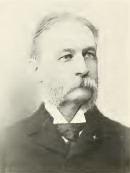 CHARLES HINMAN GRAVES The subject of this
sketch is a resident of Duluth, where he has figured
very prominently in the development of that growing city
for over a quarter of a century. His father, H. A.
Graves, was a Baptist clergyman, editor of the Christian
Watchman and Reflector, of Boston. His mother’s maiden
name was Mary Hinman, a daughter of Scoville Hinman of
New Haven, Connecticut. On both sides of the family he
is descended from old New England stock; the Graves
ancestors came over from England in 1645, and Royal
Hinman was an early governor of Connecticut. CHARLES HINMAN GRAVES The subject of this
sketch is a resident of Duluth, where he has figured
very prominently in the development of that growing city
for over a quarter of a century. His father, H. A.
Graves, was a Baptist clergyman, editor of the Christian
Watchman and Reflector, of Boston. His mother’s maiden
name was Mary Hinman, a daughter of Scoville Hinman of
New Haven, Connecticut. On both sides of the family he
is descended from old New England stock; the Graves
ancestors came over from England in 1645, and Royal
Hinman was an early governor of Connecticut.
Charles Hinman Graves was born at Springfield,
Massachusetts, August 14, 1839. He attended the common
schools of Springfield and Litchfield Academy. In July,
1861, he enlisted in the Union Army and was engaged in
all the battles of the Army of the Potomac and Army of
the James, including the first battle of Bull Run,
Williamsburg, Fair Oaks, Malvern Hill, Fredericksburg,
Chancellorsville, Brandy Station, .Mine Run, Second Bull
Run, Chantilly, Gettysburg (where he was severely
wounded,) Deep Bottom, Petersburg. Fort Fisher (where he
was promoted to the rank of major and assistant adjutant
general United States Volunteers for gallantry in the
assault) and Wilmington. Colonel Graves
enlisted as a private soldier. became corporal,
sergeant, second lieutenant, first lieutenant and
captain of the Fortieth New York Volunteers; captain and
assistant adjutant general, and major and assistant
adjutant general United States Volunteers; brevet major,
lieutenant colonel and colonel of Volunteers; first
lieutenant and captain United States Regular Infantry;
brevet major and lieutenant colonel United States Army,
and by detail, inspector general of the Department of
Dakota, and judge advocate of the Department of Dakota.
In 1870 he resigned his position in the army and engaged
in the real estate and insurance business in Duluth.
Subsequently he went into the wholesale salt and lime
business. He then engaged in the grain business as an
operator of elevators and built all the large elevators
now in Duluth.
In 1893 he returned to his original business of
real estate and insurance. He is president of the
Graves-Manley Insurance Agency, wrote the first fire
insurance policy written in Duluth, and has been
actively identified with the development of that city.
He has been a director of the St. Paul & Duluth
Railroad; stockholder and officer in the Duluth Iron
Company, which made the first pig iron that was made in
Duluth or in the State of Minnesota; was the first
subscriber to and a director of St. Luke’s Hospital,
Duluth. He has also been honored by many public offices.
Was elected mayor of Duluth for two terms by the
Republicans of that city: has been state senator for
four years; representative and speaker of the Minnesota
house for one term; was leader in the reform of the
state treasury management in 1876. He was active in
framing and passing the first law establishing a
railroad commission in Minnesota, and as a member of the
legislature represented the district which at that time
comprised all the northeastern portion of the state,
consisting of nine counties, a district three hundred
miles long by one hundred miles wide.
Mr. Graves was delegate-at-large to the National
Republican Convention of 1888, has been a delegate to
many state and district conventions in Minnesota, and
has been prominent in the Republican Party of the state
since 1875. He has represented Duluth in various
commercial conventions, and has taken an active part in
the movements for the establishment of deep waterways
from Duluth to the sea coast which have resulted in
great benefit in the northwest. Mr. Graves is past
commander of the Willis A. Gorman Post, G. A. R., of
Duluth; past senior vice commander of Minnesota
Commandery Loyal Legion of the United States; is a
member of the Army and Navy Club of Washington, D. C.;
of the Minnesota Club of St. Paul, and ex-president of
the Kitchi Gammi Club of Duluth. He was married in 1873
to Miss E.
Grace Totten,
daughter of the late Major General J. G. Totten, chief
of engineers of the United States Army. They have no
children.
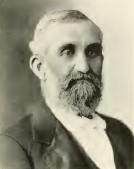 ANAK ALEXANDER HARRIS of Duluth, comes of an
old southern family which traces its line back to the
Revolutionary War. Mr. Harris’ great grandfather came
from England and settled in North Carolina long before
the colonies declared war. He was in the
Revolutionary army, and was with Washington at Yorktown,
when the surrender of Lord Cornwallis terminated that
conflict. His son, Mr. Harris’ grandfather, was a
soldier in the War of 1812. Henry Washington Harris,
Mr. Harris’
father, was born in Kentucky in 1812. He was always a
farmer, and although of limited education, was a man of
much common sense and always a leader in the community
where he lived.
He died in Texas at the age of seventy-seven. His
wife was Miss Maria Dawson, the daughter of a
distinguished Democratic politician of Kentucky of the
early times. He was a soldier in the Mexican war, and
achieved distinction. Mr. and Mrs. Harris were married
in 1836. Their son was born on January 16, 1838, and
Mrs. Harris died when he was two years old. ANAK ALEXANDER HARRIS of Duluth, comes of an
old southern family which traces its line back to the
Revolutionary War. Mr. Harris’ great grandfather came
from England and settled in North Carolina long before
the colonies declared war. He was in the
Revolutionary army, and was with Washington at Yorktown,
when the surrender of Lord Cornwallis terminated that
conflict. His son, Mr. Harris’ grandfather, was a
soldier in the War of 1812. Henry Washington Harris,
Mr. Harris’
father, was born in Kentucky in 1812. He was always a
farmer, and although of limited education, was a man of
much common sense and always a leader in the community
where he lived.
He died in Texas at the age of seventy-seven. His
wife was Miss Maria Dawson, the daughter of a
distinguished Democratic politician of Kentucky of the
early times. He was a soldier in the Mexican war, and
achieved distinction. Mr. and Mrs. Harris were married
in 1836. Their son was born on January 16, 1838, and
Mrs. Harris died when he was two years old.
The education obtained by the young scion of this
old family was obtained from the old-fashioned common
schools of Simpson, Franklin County, Kentucky, where he
was “born and raised,” to use the phrase of the people.
As he grew to manhood he determined to be a lawyer and
entered a law office in Kentucky. But before he was
ready to practice the War of the Rebellion broke out,
and young Harris enlisted as a Confederate soldier early
in 1861. He was in the first battle of Bull Run and many
other notable engagements, and in one battle was
seriously wounded. As has been the experience of many
other ex-Confederates he has found, since the close of
the war, that many of his best friends were Union
soldiers.
In 1865 Mr. Harris commenced the practice of his
profession. In 1871 he moved to Fort Scott, Kansas, and
on July 22, 1893 he became a citizen of Duluth. This
move was made because after mature consideration he came
to the conclusion that Duluth was the most promising
young city in the United States. Upon establishing
himself in Duluth Mr. Harris at once secured a large
practice. Nearly thirty years of law practice had given
him a wide experience. He had been connected with many
important cases, both civil and criminal. He was
retained, and was leading counsel, in the great case of
Merritt vs. Rockefeller, growing out of the transactions
of the parties to the suit in mining and railroad
properties. Mr. Harris was for the plaintiff’, whom in
June, 1895, obtained a judgment against the defendant
for nine hundred and forty thousand dollars. The
argument made by Mr. Harris in this case was, perhaps,
the best work of this kind which he has done. He has
received much praise and congratulation on the success
of the snit and the excellence of his conduct of the
case and his argument. Mr. Harris has been,
from early manhood, a Democrat, but has never held
office.
He is a member of the Independent
Order of Odd Fellows, and of the Methodist church. On
May 29, 1866, he was married at Lebanon, Tennessee, to
Miss Isabella S. Evans. They have two children, Henry
Evans Harris, who is now his father’s law partner, and
Laurenz R. Harris, an
electrician.
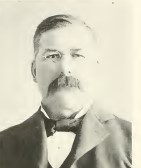 ALFRED
MERRITT The name of Merritt is identified in the public
mind with that development of the iron ore deposits of
the state on the Mesaba range, which have caused it to
become one of the leading industries of the Northwest.
It was Alfred Merritt who had the courage to make the
first practical demonstration of the extent of the
immense body of ore which lies along what is known as
the Mesaba range, and to bring Minnesota into the front
rank of the iron producing states of the Union. ALFRED
MERRITT The name of Merritt is identified in the public
mind with that development of the iron ore deposits of
the state on the Mesaba range, which have caused it to
become one of the leading industries of the Northwest.
It was Alfred Merritt who had the courage to make the
first practical demonstration of the extent of the
immense body of ore which lies along what is known as
the Mesaba range, and to bring Minnesota into the front
rank of the iron producing states of the Union.
Alfred Merritt was the fifth son of Lewis H. and
Hepsibath Merritt, born in Chautauqua County, New York,
May 16, 1847. The family moved to Oneota, now a part of
Duluth, in 1856, where Alfred has since lived and
worked. His ancestry on his father’s side is traceable
to the Huguenots, Hepsibath Jewett, the mother of the
subject of this sketch, was born in Massachusetts, of
Puritan stock, and emigrated with her parents while she
was a young girl, to Western New York. When the Merritt
family landed on the north shore of St. Louis bay in
1856 they were the pioneers in that section, and erected
their log cabin amidst the tall pines. There the mother
of the family still lives, in her eighty-third
year. There
Alfred was educated in the first common schools
established in Northern Minnesota.
At the age of sixteen Alfred became a sailor. He
was rapidly promoted, and before his majority he became
master of his own vessel. For many years he followed
navigation on the lakes, and was afterwards engaged in
the business of a lumberman in company with his brothers
and nephews, and in this occupation he was able to
gratify his early bent for the adventurous life of an
explorer, and one of the results of his untiring and
well directed energies was the discovery and development
of the Mesaba iron range. It is due to the late Cassius
C. Merritt, however, to say that the first discovery of
Bessemer ore on the range was made by him who had so
long, so bravely and so hopefully dared the dangers and
hardships of the trackless wilderness. Although at times
embarrassed and in danger of losing their large
interests in the iron mines, it must be conceded that it
was the genius and pluck of the Merritts which developed
the iron industries of the state and placed Minnesota in
the front rank as an iron producer. It was their
skill and courage that conceived and constructed the
Duluth, Missabe & Northern railroad, and it was
their capital and brains that constructed the greatest
ore docks in the world at Duluth, and assured to that
city the transshipment of its cargoes, against the most
determined, bitter and powerful opposition. Their work
prospered, and in an almost incredibly short space of
time the road was so far completed that the products of
the mines were distributed over their lines to the
waiting furnaces in all parts of the country.
In 1876 Mr. Merritt was married to Miss Elizabeth
Sandelands, to whom were born three children, Lewis H.
now a student at Hamline college; Thomas since deceased,
and Elizabeth, the youngest, whose mother died shortly
after her birth, in July, 1882. In 1885 Mr. Merritt was
married to Miss Jane A. Gillis, whose four children are
Jessie, Alta H., Ernest A. and Glen J. The Merritts have
a picturesque home on the hillside overlooking the broad
bay and far reaching river surrounded by every comfort
and convenience. In politics Mr. Merritt is a
Republican, and in religion a Methodist. He is a helpful
and sympathizing neighbor, and a loyal counselor and
friend.
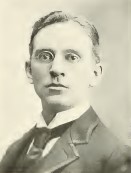 CHARLES ARNETTE TOWNE Mr. Towne is the
representative in Congress of the Sixth District of
Minnesota. Until the adoption of the money plank of the
platform at St. Louis, June 18, 1896, he was an ardent
Republican, cherishing as one of the proudest events in
his family history that his father cast his first ballot
in 1856 for Fremont and Dayton, the first standard
bearers of the Republican party. CHARLES ARNETTE TOWNE Mr. Towne is the
representative in Congress of the Sixth District of
Minnesota. Until the adoption of the money plank of the
platform at St. Louis, June 18, 1896, he was an ardent
Republican, cherishing as one of the proudest events in
his family history that his father cast his first ballot
in 1856 for Fremont and Dayton, the first standard
bearers of the Republican party.
Mr. Towne was born November 21, 1858, on a farm
in Oakland County, Michigan, the son of Charles Judson
Towne and Laura Ann Fargo (Towne) His father was a
farmer, whose life was uneventful and devoted to the
rearing of his family and the faithful performance of
his duties as a citizen. The American
line of the Towne family is traced to John William and
Joanna Blessing Towne, who landed at Salem,
Massachusetts, in 1636. Among their
numerous descendants have been Salem Towne, the author
of school text books in general use a generation or two
ago, and Henry M. and A. N. Towne, both of whom became
prominent in the present generation as railroad men. On
the mother’s side the ancestry embraced branches of the
Mason and Lawrence families, prominent in the Colonial
history of this country.
Charles Arnette began his education in the common
schools of Michigan, and is a firm believer in the value
of influences which that democratic institution exerts
in the shaping of motives and sympathies and in the
formation of character. He entered the University of
Michigan in 1875, but was not able to pursue his studies
continuously on account of poor health. He was
graduated, however, in June, 1881, from the academic
department with the degree of Ph. D. He belonged
to no secret college societies. He was elected orator of
his class in the senior year, and delivered in that
capacity at graduation an address on civil service
reform. He also lectured on that subject in the winter
of 1880 and 1881 at the university, as part of the
lecture course in which ex-Governor Austin Blair,
Professor Moses Tyler, Judge T. M. Cooley and Hon.
Sherman S. Rogers participated. After graduation
Mr. Towne
declined several offers of professorships, but accepted
an appointment as chief clerk in the department of
public instruction at Lansing, Michigan. In that
capacity, and in a similar one in the state treasury
department, he remained until the fall of 1885. In the
meantime he had prosecuted the study of law, and, with a
natural aptitude for public speaking, had participated
in state and national campaigns, an experience which he
began as early as the campaign of 1876. In 1884 he was
talked of by the newspapers and politicians as a
suitable candidate for congress from the Fifth District
of Michigan. He made no effort to secure the nomination,
however, regarding himself on account of his youth as
not properly equipped for the office. He was then
twenty-five.
In April 1885 he was admitted to the bar and
began the practice of law at Marquette in March, 1868.
In March, 1889, he moved to Chicago, where he continued
the practice of law until June, 1890. He was then much
impressed with the future of Duluth, and in August of
that year located in that city, where he still
resides.
His professional career has not been long, but it
has been a successful one, involving various important
litigations. He is a member of the firm of Phelps, Towne
& Harris, formed January i. 1895, and
composed of H. H. Phelps, L. C. Harris and himself. Mr.
Towne never held any office prior to his election to
Congress, although at different times solicited to
become a candidate. He was elected
to Congress in 1894, and his career as a member of that
body has been a brilliant one. Mr. Towne has been an
ardent advocate of bimetallism, and no speech delivered
in the House of Representatives on that side of the
money question during the first session of the
Fifty-fourth Congress attracted nearly as much attention
as his, an effort which at once aroused interest in him
as one of the most brilliant orators in the house and
among the foremost advocates of the financial views
which he holds. Mr. Towne is largely a self-made man,
for, while his father, out of the scantiness of his
limited resources, and out of his great genius for
economy, furnished from the proceeds of his labor a
large part of the money necessary to pay college
expenses and while some assistance was received from Dr.
C. P.
Parkin, of Owosso, Michigan, whom Mr. Towne honors in
memory as one of the grandest and noblest characters he
ever knew, much of the money necessary for the
prosecution of his studies was earned by himself as a
school teacher and in other ways. Mr. Towne was married
April 20, 1887, to Claude Irene Wiley at Lansing,
Michigan. They have no children.
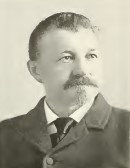 CASPER HENRY TRUELSEN Mayor of Duluth,
was born October 20, 1844, in Schleswig, Germany. His
father was a blacksmith by trade, and died at the age of
thirty-seven from the results of a fall into a vat of
boiling water. His mother was Magdelena Dienhofif, and
for some years previous to her marriage was cook for the
household of the Duke of Schleswig-Holstein. After the
death of her husband she supported the family,
consisting of four children and her father and
mother-in-law, by cooking at large gatherings, weddings,
balls and similar occasions. In this capacity she was
famous all over the dukedom. CASPER HENRY TRUELSEN Mayor of Duluth,
was born October 20, 1844, in Schleswig, Germany. His
father was a blacksmith by trade, and died at the age of
thirty-seven from the results of a fall into a vat of
boiling water. His mother was Magdelena Dienhofif, and
for some years previous to her marriage was cook for the
household of the Duke of Schleswig-Holstein. After the
death of her husband she supported the family,
consisting of four children and her father and
mother-in-law, by cooking at large gatherings, weddings,
balls and similar occasions. In this capacity she was
famous all over the dukedom.
As a boy Mr. Truelsen went to the public schools
of his native city, and was confirmed in the Lutheran
church when fifteen years of age. He made his first
money as waiter and shoe boy in a hotel at Schleswig
when fourteen years of age. That year he
worked mornings and evenings and went to school during
the day, receiving twelve dollars a year and board for
his services. The next year he was bound as an
apprentice to a grocer to serve five years without any
compensation except his board. This was a hard
experience.
He worked from six in the morning till ten at
night, on his feet all the time, and with no fire in the
store in winter. Little time was given for rest and
recreation.
After his hard term of apprenticeship was over he
obtained a better situation, but in 1866 decided to
emigrate. Upon coming to this country he went first to
Eagle River, Michigan, where he became bookkeeper for
John H. Hansen. Three years later he was attracted by
the fame of the young town of Duluth, and thinking that
it had a great future before it, he resigned his
position, and with his wife and baby took up his
residence in the Zenith City. He was married
in 1866 to Miss Henriette Hansen at Eagle River.
Duluth, when Mr. Truelsen first saw it, on May 8,
1869, was a mere hamlet. But the act
authorizing the construction of the Lake Superior and
Mississippi River Railroad had been passed and the
future of the place was assured. There being no boarding
house in the town Mr. Truelsen was obliged to stop in
Superior until he could build on Minnesota Point a small
cabin of two rooms. He had neither money, friends nor
acquaintance in the place so he took the first job which
offered—that of mixing mortar for a plastering firm.
During the first summer he mixed mortar diligently. In the fall he
went to work on the railroad grade and later in a stone
quarry. As he came from a mining country it was supposed
that he understood drilling and blasting, and he was
given important work, while in fact he had never handled
a quarryman’s tools before. He managed to do the work
until a premature blast led him to think that some other
employment would be safer. A short time after, in June,
1870, he went into partnership with Michael Pastoral and
carried on the grocery, and later the general
merchandise business for many years. This business
was continued until 1885, when he sold out. Meanwhile,
in 1880, he had acquired an interest in the Duluth Fish
Company, and did a very large business until 1886, when
he sold to A. Booth & Son.
Mr. Truelsen has been uniformly successful. About
the time that Mr. Truelsen entered business he also
entered politics. He was alderman for four terms, was
elected sheriff of St. Louis County in 1886 and served
as such for one term, was appointed member of the board
of public works in 1891, and served as president until
1894. During the latter year the people of Duluth voted
to buy the water works plant at what Mr. Truelsen
considered an excessive price. He attacked the legality
of the election and won in the supreme court. In 1896 he
was elected as mayor on the issue of city ownership of
water works by building, and triumphed over the
Republican candidate by a majority of seven hundred and
seventy nine votes, and after one of the hottest
campaigns the city had ever seen. In this fight all the
dailies in the city were arrayed against him. Mr. Truelsen’s wife died on May 26, 1895. They have
had nine children, of whom five are living. These are
Magdelena, Henry, Ida, August and
Mary.
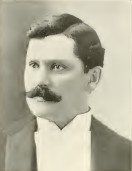 ALFRED EDGAR WALKER of Duluth, is the son of
George Walker, a farmer of London, Ontario, a local
magistrate for twenty years, and a leading citizen of
his community. His wife’s maiden name was Sarah Anne
Morden, whose grandparents were Loyalists, and who,
after the Revolutionary War crossed over from Detroit
and went up the river Thames settling near Chatham. George Walker
was born in England, of Scottish parentage, a son of a
west of England manufacturer. He came to Canada early in
his teens, and with two elder brothers and two sisters
located at what was then called “Muddy York,” now
Toronto. His next older brother, Robert, established
“The Golden Lion,” a dry goods store which became famous
throughout the whole region, and out of which the
founder produced an estate of over a million dollars.
Robert Walker was also the first secretary and treasurer
of the Methodist Society in Canada, and one of the
founders of Methodism in the Dominion. A marble statue
of him adorns the Carleton Street Methodist Church in
Toronto. ALFRED EDGAR WALKER of Duluth, is the son of
George Walker, a farmer of London, Ontario, a local
magistrate for twenty years, and a leading citizen of
his community. His wife’s maiden name was Sarah Anne
Morden, whose grandparents were Loyalists, and who,
after the Revolutionary War crossed over from Detroit
and went up the river Thames settling near Chatham. George Walker
was born in England, of Scottish parentage, a son of a
west of England manufacturer. He came to Canada early in
his teens, and with two elder brothers and two sisters
located at what was then called “Muddy York,” now
Toronto. His next older brother, Robert, established
“The Golden Lion,” a dry goods store which became famous
throughout the whole region, and out of which the
founder produced an estate of over a million dollars.
Robert Walker was also the first secretary and treasurer
of the Methodist Society in Canada, and one of the
founders of Methodism in the Dominion. A marble statue
of him adorns the Carleton Street Methodist Church in
Toronto.
Alfred Edgar Walker was born in London township,
County of Middlesex, December 3, 1862. He received his
education in the neighboring township school and passed
from there into the collegiate institute at the age of
sixteen. For three years he walked four miles to school,
and at the age of nineteen passed his examination for a
license as a teacher. He also attended
a model training school for teachers, and in a class of
thirty-six came out first in a final examination and
secured a certificate good for three years. Dr. Walker
taught school for four years, 1882 to 1886, in order to
earn sufficient funds to enable him to take a course of
medicine for which he had a preference. He entered the
Western University medical department in 1886, at the
age of twenty-three years, and spent three years in that
institution, passing with honors each year.
In the fall of 1889 he went to Bellevue, New
York, from which place he graduated in 1890, returned
home by way of Toronto and passed examination there for
member of the College of Physicians and Surgeons. When
he returned home his father had his location selected
for him, but he had determined to come West, and after a
two months’ visit at home he started for Duluth. It was
while he was in New York that the geographical location
of that city had attracted his attention, and he
determined to make it his home if the condition of
things there appeared altogether favorable. He was
especially fortunate in obtaining sufficient
professional work almost from the start to make his
business profitable. He was able to earn his expenses by
the third month and has built up a profitable and
thrifty practice. He is more than satisfied with his
choice of a location and has been exceedingly successful
in his treatment of fevers during the rage of typhoid in
that city. Dr. Walker is a member of the American
Medical Association, the Minnesota Medical Society, and
the St. Louis County Medical Society, and one of the
charter members of the Interurban Academy of Medicine
for Duluth and Superior; of the Duluth Boat Club, the I.
O. O. F. and is a thirty-second degree Mason. He was
married August 15, 1895 to Miss Adella Shores, of
Ashland, Wisconsin, eldest daughter of E. A.
Shores.
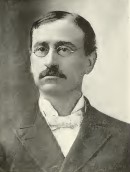 JED L. WASHBURN is an attorney of Duluth,
Minnesota. His father, Christopher C. Washburn, a
retired farmer of Blue Earth County, was one of the
pioneers of Southern Minnesota. He was a native
of Southern Ohio and settled in Minnesota in 1856. The
following year he brought his family over-land from
Indiana, the subject of this sketch then being but a few
months old. Mr. Washburn’s wife was Miss Julian Showen,
a native of Kentucky, and a woman of strong moral and
religious convictions. She still lives
with her husband at Lake Crystal, Minnesota. JED L. WASHBURN is an attorney of Duluth,
Minnesota. His father, Christopher C. Washburn, a
retired farmer of Blue Earth County, was one of the
pioneers of Southern Minnesota. He was a native
of Southern Ohio and settled in Minnesota in 1856. The
following year he brought his family over-land from
Indiana, the subject of this sketch then being but a few
months old. Mr. Washburn’s wife was Miss Julian Showen,
a native of Kentucky, and a woman of strong moral and
religious convictions. She still lives
with her husband at Lake Crystal, Minnesota.
Their son Jed was born in Montgomery County,
Indiana, on December 26, 1856. His boyhood was passed
amid the exciting scenes of the pioneer life in
Minnesota four decades ago. He well remembers the Indian
outbreak of 1862, and the final termination of the
troubles by the hanging of the leaders of the Sioux at
Mankato. He received an academic education, including a
limited course in literature and languages, and a good
course in mathematics. But his education has been mainly
self-acquired. His reading has been as extended as a
busy life would permit. After leaving school he taught
for a number of years, and at one time, while engaged in
studying law was teaching in the public schools of
Mankato afterwards he served for a number of years on
the Board of Education of that city, and for a
considerable time he was its president.
Mr.
Washburn studied law with Hon. Martin J. Severance, of
Mankato, now Judge of the Sixth district, and was
admitted to practice in the spring of 1880. For ten
years he lived in Mankato and built up a large practice
throughout southern Minnesota. In 1890 Mr. Washburn
moved to Duluth, where he has been equally successful in
his law practice. At first he practiced alone, but in
September, 1895, formed a partnership with Judge Charles
L. Lewis, who resigned from the bench to enter this
connection.
At the same time Lucius E. Judson, Jr., and Wm.
D. Bailey who had, for a long time, been employed by Mr.
Washburn, were also taken into the firm, the name being
Washburn, Lewis & Judson. During Mr. Washburn’s
practice he has been engaged in many important trials,
and connected, in a professional way. with numerous
heavy business and financial transactions. His practice has
covered almost the entire field of litigation, but since
his removal to Duluth he has endeavored to confine
himself as much as possible to corporate and real estate
law. He is counsel for many corporations, and his duties
have taken him to all parts of the country. He is
attorney at Duluth for several railway companies,
including the Northern Pacific, Chicago, St. Paul,
Minneapolis & Omaha Railway Company, and Duluth
Transfer Railway Company. For the latter company he did
the work of its organization and the difficult legal
work of getting its lines established in the congested
bay front of Duluth. Mr. Washburn has
considerable property interest in Duluth and upon the
iron ranges, and resides in the suburb of Hunter’s Park,
where he has a beautiful home. In politics he has been
classed as an independent Democrat, but has rarely taken
an active part in the affairs of the party.
In May, 1882, Mr. Washburn was married to Miss
Alma J. Pattee, who was a graduate of the State Normal
School at Mankato, and who was a teacher for some time
in that institution. Mrs. Washburn is
a native of Wisconsin, though of New England descendent
is a lady of much literary ability and a frequent
contributor of papers on topics considered in the
numerous associations to which she belongs. Mr. and Mrs.
Washburn have five children, two boys and three girls,
Claude, Genevieve, Abbott, Mildred and Hope. Mr.
Washburn has two Brothers, Rev. Frances M. Washburn
pastor of the First Congregational Church at Mankato,
and Edward W. Washburn, merchant, at Lake Crystal. His
only sister is Mrs. Jennie W. Webster, of
Juniata, Nebraska.
The information
on Trails to the Past © Copyright may be used in personal family history research, with source citation. The pages in entirety may not be duplicated for publication in any fashion without the permission of the owner. Commercial use of any material on this site is not permitted. Please respect the wishes of those who have contributed their time and efforts to make this free site possible.~Thank you! |



